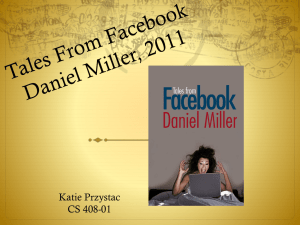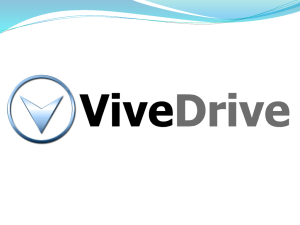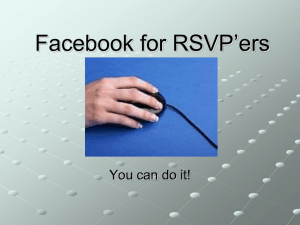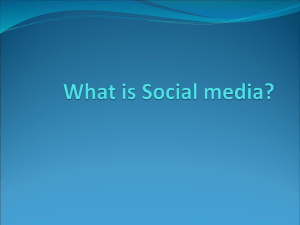Facebook PowerPoint - University of Windsor
advertisement
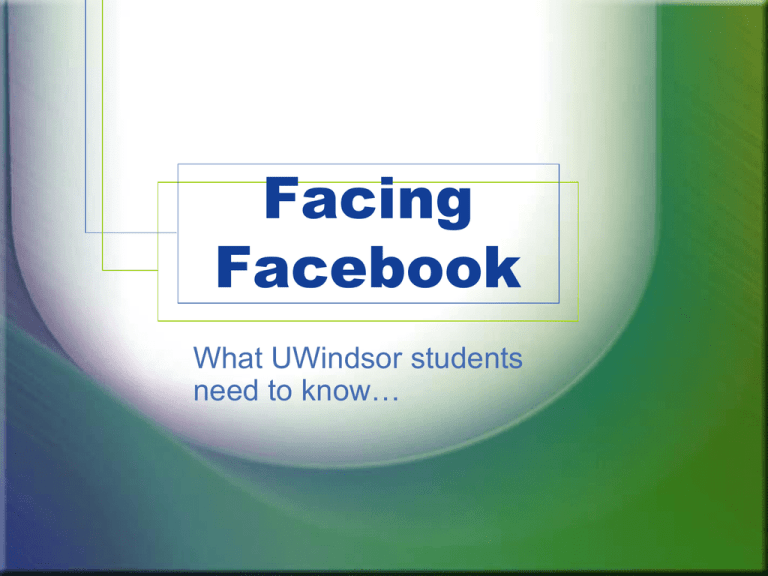
Facing Facebook What UWindsor students need to know… What can Facebook Do For You? • Help you to connect or reconnect with friends • Stay in touch with long distance relationships • Share photos, videos, information • Join groups with like minded people What can Facebook Do For You? • Invite people to events • Community building • Get up-to-the-minute information on people or events • Make you have a sense of belonging and provide social interaction How Can Facebook Impact You Negatively? • Friends –knowing too much about you and you about them • Posting inappropriate photos and not having control on photos posted of you • Joining groups that may reflect poorly on your choices • Postings on walls that may use foul language or reflect poorly on you What Does it Really Matter Anyway? • It’s nobody’s business –it’s my private world! • Right? • Not really…. Privacy? Is there such a thing? • • • • • • • • • Employers Your ex-girlfriend Your boyfriend’s parents Your academic advisor Your professors Your reference for your next job Your mother Your roommate’s parents The guy down the street who gives you the creeps Information to Avoid • Your “Info” page: – your birthdate (especially the year of your birth) can make you more susceptible to fraud – Your address – Contact info, cell phone, etc – Your schedule – Groups associated with -(be careful if they are offensive) From a Professional Perspective • Is it just for fun, or are there people viewing my profile who may be judging me? “If you say it to one person on Facebook, you say it to the whole world.” But I Have the “Privacy” Setting Turned on • Is it set to only “friends” or can the entire “University Community” gain access? – “People at Windsor and friends” – means ANYONE associated with the U could potentially see your profile –even Alumni –ie employers, professors, etc – “Friends of friends” – “Only friends” –those you invite – “Customize” –most secure Who Can See My Profile? • Although it can feel private, it is a very public forum • People share photos, look at profiles in public places, and view friends’, and friends’ of friends • Your “friends” may not have the same level of privacy settings as you thereby making your information accessible to more people than you think • Read the fine print “Facebook’s Privacy Policy” and “Safe Use Principles” How Well Do You Really Know Your “Friends”? • Don’t focus on trying to acquire as many “friends” as possible • Be selective OR consider “customizing” your privacy for those who are not “close friends” • Ignoring a friend request is perfectly okay if you aren’t sure Think About It . . . • Who’s looking over your “friends’” shoulders while they are looking at your profile? • Many employers look up potential employees on Facebook to get a better understanding of the applicant. • Consider this: • http://www.cbsnews.com/stories/2006/06/20/eveningn ews/main1734920.shtml?source=RSS&attr=SciTech_ 1734920 Think About It . . . • Bikini clad, beer chuggers will not impress a recruiter • Even if your profile is closed, people who know people can inadvertently encounter your information –it’s a small world! • Parts of your profile can remain accessible to the World Wide Web in more ways than you might realize –a mere “google search” can turn up a lot of information about you from the past Groups and Your Association With Them: • Maybe you work at Tim Horton’s and you join the group “Outraged Tim Horton’s Staff Unite: We know how much it REALLY sucks” • Would this leave a good impression if your boss saw your profile? • What about future employers who might be watching? You, the role model…. • Perhaps you are in a mentorship role? (Leader, coach, scout leader, volunteer at a school) • Your mentee goes home and looks you up on Facebook and sees you in unflattering photos • What message are you sending? Attention: Everyone • Although your online activity is not likely to be monitored, you could be held accountable if you are engaged in questionable behaviour • What you wouldn’t put on a poster for all to see (including grandparents and professors), you might want to think twice about posting online Did Someone Say Police? • At some institutions, following an incident such as a party that gets out of hand, campus and city police have found information or photos on Facebook that may provide incriminating evidence about the individuals involved • Underage drinking, keg parties, acts of vandalism Misinterpretations • Think about how the content on your Facebook could be interpreted or misinterpreted. • What may seem like a joke to you and your friends, could be seen as serious by someone else. Addicted to Facebook? • Stories of Facebook addiction are also common. • Did you know that Facebook gets more than 65 billion page views per month and more than half of active users return daily? • Some students log in to their profiles several times a day • Remember why you are at University Addicted to Facebook? • How much time are you “Facebooking” every day? • Are you using it wisely? Is it controlling your every move? • How might this affect your work, school, and social life? Fighting the Addiction • Face to Face vs. Facebook • Don’t kid yourself –logout or turn off your computer when you’re studying • Set goals –what do you need to accomplish? • Time allocation –give yourself time limits –use it as a reward after you accomplish your goals Look at the Bright Side • Creating or refining one’s self identity and values • Use it to build connections with peers and create civility • Connect with people and groups that foster a positive sense of community • Learn to use technology in creative and useful ways The YouTube clip below helps to illustrate that although there are many positive uses for Facebook, sometimes, users may get carried away. http://www.youtube.com/watch?v=nrl SkU0TFLs Don’t Be a Facebook Fool! • A Google search of “Facebook cautions” provides many articles and tips on using Facebook • Be informed and use it wisely

